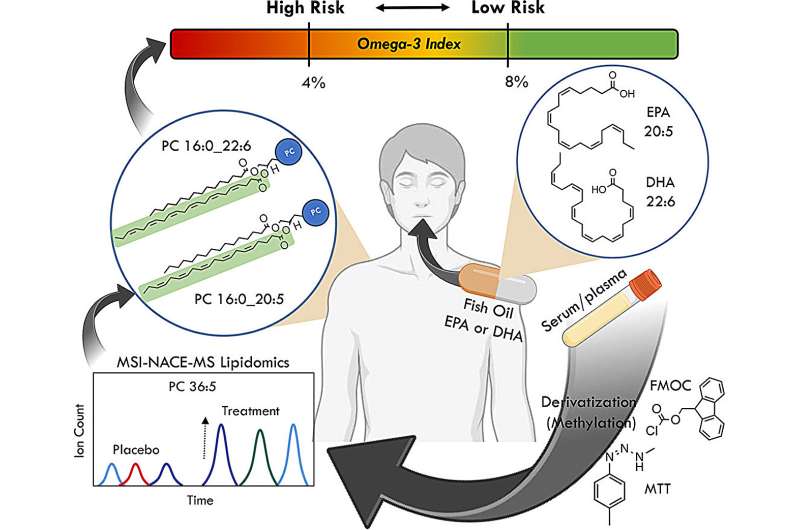This article has been reviewed according to Science X's editorial process and policies. Editors have highlighted the following attributes while ensuring the content's credibility:
fact-checked
peer-reviewed publication
trusted source
proofread
Omega watch: Researchers develop new blood test for measuring levels of critical omega-3 fatty acids

Researchers at McMaster and the University of Guelph have discovered a convenient new way to track levels of omega-3 fatty acids in the bloodstream, making it much easier to access information that is critical to cardiovascular and cognitive health, but which has previously been challenging to gather.
While the human body can generate most of the fats it needs, it cannot produce adequate levels of omega-3 fatty acids and must obtain them from dietary sources.
Two key omega-3 fatty acids, called EPA (eicosatetraenoic acid), and DHA (docosahexaenoic acid), can be derived only from certain sources, such as fish, seafood, enriched foods, and supplements, but measuring how much gets into the blood has been both difficult and invasive.
In addition to increasing the risk of cardiovascular events, a lack of omega-3 fatty acids has also been associated with inflammation and other health conditions, including cognitive impairment, depression, fetal neurodevelopment, and premature birth.
The newly discovered biomarkers of the Omega-3 Index (O3I) will make it easier for researchers to study omega-3 fatty acid nutrition in support of population health, including vulnerable groups.
"This reflects that you are what you eat. Omega-3 fatty acids are primarily derived from our diet and are incorporated into the membranes of all cells and tissues in your body," says Philip Britz-McKibbin, lead author of the study and a professor of chemistry and chemical biology at McMaster University.
"In general, if you have an O3I below 4 percent you may have a higher risk for a cardiovascular-related event. Conversely, individuals with an O3I above 8 percent have a lower risk. But since O3I is a modifiable risk factor, you can change it through diet."
"The body's response to omega-3 supplementation can vary significantly between individuals, with distinct health benefits reported for patients who consumed only EPA, only DHA, or a mixture," says Britz-McKibbin.
Existing tests to measure the Omega-3 Index have required drawing large volumes of blood and complicated laboratory work to analyze their omega-3 fatty acid content. As a result, most clinicians do not routinely measure O3I. The new method opens the door to regular screening, which can help clinicians and patients understand how much supplementation is necessary.
"Testing for the O3I is a complicated procedure so it's not routinely available for patient screening, despite the popular use of fish oil supplements, and promising clinical evidence of the many health benefits from optimal omega-3 fatty acid nutrition," says Britz-Mckibbin. "This should make it much more convenient to do routine testing since dosage levels and product formulations differ widely in their exact omega-3 fatty acid composition."
The study has been published in the Journal of Lipid Research and co-authored by Stuart Phillips, a professor of kinesiology at McMaster and David Mutch, a professor of human health and nutrition at the University of Guelph.
Participants in the study were given between 3 and 5 grams of fish oil, EPA or DHA supplements per day. Researchers performed lipid profiling to isolate specific O31 biomarkers from among hundreds of detectable circulating lipids.
"Our test can be part of a routine blood test without any special requirements," says Britz-McKibbin. "By directly measuring only two specific biomarkers in a blood sample, we can rapidly assess the O3I without time-consuming and costly sample workup protocols prior to analysis."
Researchers also plan to identify a surrogate biomarker of the O3I with a urine-based test, which would eliminate the need to draw blood entirely.
More information: Ritchie Ly et al, Lipidomic Studies Reveal Specific Circulating Phosphatidylcholines as Surrogate Biomarkers of Omega-3 Index, Journal of Lipid Research (2023). DOI: 10.1016/j.jlr.2023.100445





















